More than just your average ecommerce platform, Shopify makes it easier to track the performance of your digital campaigns, upgrade your ecommerce solutions, and earn more conversations. As one of the fastest-growing SaaS services for online businesses, Shopify has turned the heads of countless entrepreneurs.
However, just because Shopify stands out as one of the leading ecommerce site products, doesn’t mean that it’s going to be the right solution for everyone. We’re living in a rapidly-evolving digital world, where companies consistently adapt and transform to suit the needs of their customers. While Shopify’s simplicity, convenience, and legacy is sure to appeal to many people, there are going to be some companies out there that need something different.
Fortunately, Shopify is far from the only option for your ecommerce store.
As of 2018, there were 1.8 billion global digital buyers online. As the landscape for digital selling continues to grow, numerous software providers have taken their first steps into the market, offering advanced features, open-source technology, and more.
Here’s your guide to some of the top Shopify competitors for 2022.
How to Choose Shopify Alternatives
Shopify competitors come in a variety of different styles, from free services specifically created to support small businesses, to large ecommerce systems with shopping cart technology and payment gateways built-in. The diversity of the marketplace means that choosing the right ecommerce solution for your store can be tough.
Top Shopify Competitors for Small Businesses
Top Shopify Competitors for Large Businesses
Top Free Shopify Competitors
So, what if you need a Shopify alternative for a less established company?
Maybe you only just started to explore the potential of blogging and selling online, and you’re keen to find an affordable way to start making a real profit with your digital presence. If that’s the case, then your focus when building an ecommerce store is likely to be more on budget-friendliness, ease-of-use, and flexibility.
The Good News?
There are plenty of great tools to choose from. Here are some of our favorites.
Shopify Competitor for Small Businesses #1: Wix
Finally on our list of Shopify competitors for small business owners, we have Wix. This popular website-building solution is hosted, similar to Shopify. That means that you don’t need to worry about managing your back-end security and compliance. Additionally, Wix also comes with a convenient drag-and-drop builder, ideal for creating the best custom websites.
As Shopify competitors go, Wix is an affordable option with a variety of helpful features. However, there are some transaction fees to be aware of- such as a 2.9% plus 0.3 cents cost for every US purchase. On the plus side, Wix does integrate with a number of leading payment solutions, including Stripe and PayPal.
Wix also makes it easy to get your hands on an SSL certificate – you’ll get one for free for as long as you’re a customer of the Wix brand.
Shopify Competitor for Small Businesses #2: Square Online
Square Online is a fantastic alternative to Shopify for small companies. This is the compelling store building solution that comes packaged in with the Square Point of Sale system. You can use the Square Online to build your website for free, with unique themes and various customization options. However, you will be required to use the order fulfillment and point of sale solutions from Square.
Square’s online store is a particularly useful alternative to Shopify if you sell products both online and in-person. The company is excellent at offering a range of tools for in-person selling. Additionally, Square automatically syncs your online orders, items, and inventory information.
There are some expenses to consider with the Square store, even though it’s free to access. For instance, you’ll need to pay 2.5% for every transaction, and you will be required to pay for other expenses, like hosting, your specialist services, and your security strategies. However, if you’re already using the Square portfolio for your selling strategy, this could be a great choice of tools.
Shopify Competitor for Small Businesses #3: Squarespace
Squarespace is one of the market leaders in the world of web design, and it’s very similar in style to Shopify. With Squarespace, you can enjoy a platform that’s quick and convenient for anyone to use – even if you don’t have many in-depth technical skills.
A slick and convenient way to build your ecommerce store, with access to a range of plugins to upgrade your performance, Shopify will be a natural favorite among many small business owners. Perhaps the best thing about this solution is that the platform makes it easy to drag and drop your web pages into place. Any novice can create a fantastic looking website. What’s more, there’s even access to various advanced features, like abandoned cart recovery, marketing tools and analytics.
SquareSpace offers an excellent combination of shopping cart and content management software. What’s more, there’s a free trial available if you want to explore the benefits before you spend your money.
Shopify Competitor for Small Businesses #4: Volusion
If you need an exceptional service to support your online business, but you don’t have a lot of extra money to spend, then Volusion could be just the thing you’ve been looking for. The pricing for this product is very similar to Shopify, starting at around $15 per month for the lower-level packages.
Additionally, just like Shopify, Volusion will give you access to a bunch of fantastic back-end customization, including responsive theme options for your web store. Volusion actually has a much longer history in ecommerce than Shopify. However, it hasn’t gained as much attention, because the company frequently positions itself as the best service for SMBs. Alternatively, Shopify attempts to be everything for everyone.
As a hosted service, Volusion will take a lot of the stress off your shoulders when you’re building your website, including things like platform maintenance, secure checkout experiences, and more. One downside, however, is that Volusion doesn’t have quite as much of a community as Shopify.
Shopify Competitor for Small Businesses #5: Shift4Shop (formerly 3dcart)
Shift4Shop is a handy Shopify competitor, specifically designed to appeal to small businesses that want to be able to access add-ons and extra services, like dropshipping support and affiliate marketing. One of the best things about Shift4Shop for small business owners is that it offers a host of unique features for a price that’s very similar to Shopify.
Like Volusion, Shift4Shop is a fully-hosted ecommerce service. That means that all of the complicated things are handled for you, so you don’t need to spend as much time working out the back-end. Additionally, although Shift4Shop comes with a range of different packages to suit unique customers, every plan comes with access to unlimited product capacity, 100s of payment method choices, and fantastic customer support.
Shift4Shop also comes with the benefit of making it easy to combine your storefront with your sales and marketing strategies. For instance, you can integrate your store with MailChimp for email marketing, Amazon, Google analytics, and Facebook. That means that it’s much easier to discover new ways of encouraging conversions.
Shopify Competitor for Small Businesses #6: Ecwid
Simple, packed with features, and great for beginners, Ecwid is a convenient tool for selling all kinds of products online. Unlike some of the Shopify competitors on the market, Ecwid is unique because it plugs into your existing CMS. This means you don’t have to build a new website from scratch if you already have one. Instead, you can add sales functionality to start selling immediately.
Ecwid is flexible and versatile, with a range of capabilities, such as the option to customize your checkout pages and upgrade the transaction process. There are no limit on the product options you can offer to customers, and the user-friendly backend merges with the CMS you’re already using, so there’s no need to learn any new technology from scratch.
Simple and effective, Ecwid might not have as many advanced features as some of the leading store solutions on the market, but you’ll still get all the support you need for an exciting sales experience. There’s also the option to accept various credit cards and payment options, so you won’t scare customers off with limited opportunities.
Shopify Competitor for Small Businesses #7: Big Cartel

Big Cartel stands out as an exciting Shopify competitor for a number of reasons. First and foremost, a leading benefit of this product is how versatile it is. As well as a selection of relatively common product packages, Big Cartel also offers free plans for people who sell fewer than five products and custom plans for those who plan to sell less than 300 products.
If you’re a unique small business that needs a store solution that’s tailored to you, Big Cartel could be the perfect option. This service is particularly well-suited to creative entrepreneurs like artists and fashion enthusiasts. The software comes with access to custom themes that you can use to sell just about anything. What’s more, you’re free to customize the look and feel of your store.
To help with managing your web store, Big Cartel also offers a selection of user-friendly tools on the back-end, which you can access to check your site’s performance, run promotions, add products, and manage orders. You can even check-in on your store in real-time on any device.
Shopify Competitor for Small Businesses #8: WooCommerce
If you’re running a WordPress site, or you’ve been thinking about using WordPress to launch your company, then you’ve probably heard of WooCommerce already. WooCommerce is the leading ecommerce solution for WordPress websites. Along with other add-ons for the WordPress experience, it can make it easier for you to monetize your store, without any prior coding knowledge.
As an open source solution, WooCommerce stands out among Shopify alternatives, giving merchants the ability to modify, edit and customize their code. If you have developers in your small business team, then you can adjust various aspects of your platform’s capabilities. You can’t achieve the same customization with Shopify or other hosted platforms. However, the open nature of WooCommerce also means that you need to take more responsibility for your website hosting, compliance and security.
On the plus side, WooCommerce comes with access to a huge community of people who can help you with building and maintaining your store. Additionally, WooCommerce works well with other WordPress plugins for everything from Google analytics, to SEO management. You can even get add-ons for shipping and tax management.
Shopify Competitor for Small Businesses #9: Weebly
If what you really want from a Shopify competitor, is something that you feel comfortable using right out of the box, then Weebly could be the top choice for you. One of the most user-friendly services for companies looking to get started online, Weebly helps you to launch your brand quickly and conveniently.
Additionally, if you’re light on budget, then Weebly is a little cheaper than the basic plan from Shopify, so you can save some much-needed cash. Unlike some other low-cost solutions on the market, Weebly also doesn’t compromise on customization options. You can change your fonts, your themes, background images, and more. Additionally, there’s a free trial to get you started, where you can play around with the drag and drop builder.
Weebly isn’t the most advanced Shopify alternative on the market, and there are a few ecommerce features missing from the lineup. However, it should be more than enough to satisfy most small business owners.
Shopify Competitors for Large Businesses
Big businesses need a very different set of features for their ecommerce site than small companies. For instance, if you’re a larger organization, then you might need more than just a basic payment gateway and shopping cart. Instead, you could need something that allows you to quickly and easily convert currencies for global buyers or calculate shipping costs for long-distance deliveries.
Some ecommerce options are better-suited to large businesses than others. Our top choices for big companies are BigCommerce, Magento, or Square Online (if you're looking for a free solution).
Shopify Competitor for Large Businesses #1: BigCommerce
BigCommerce is an industry-leading ecommerce software solution that includes everything you need to develop effective online business, and then some. The standard plan, available for $29.95, comes packed with functionality, including 24/7 live agent support, single-page checkouts, discounts, coupons, point of sale systems and more.
BigCommerce stands out from other competitors in the market by offering a truly phenomenal selection of out-of-the-box capabilities – ideal for B2B ecommerce. The service relies a lot less on apps and plugins to create a complete experience for customers than other Shopify alternatives.
BigCommerce also released a plug-in for WordPress sites recently, which allows merchants to expand their sales strategy with a content-first and blogging mindset. Companies can build and maintain their website using one of the world’s most popular CMS systems, then use BigCommerce just for the checkout process. This is something commonly referred to as headless commerce.
What’s more, the more you’re willing to spend for BigCommerce, the more features you’ll get, including abandoned cart saving and recovery, back-end marketing tools, and unlimited product listings. Oh, and there are absolutely no transaction fees.
Shopify Competitor for Large Businesses #2: Magento
Magento is another software solution competing for the title of best Shopify competitor. In fact, before BigCommerce and Shopify existed, Magento was the ultimate choice for building an efficient online store. This open-source platform stands out as one of the most reputable SaaS options in the history of online selling.
Magento’s ecommerce platform gives businesses the freedom to create sensational shopping experiences, with unlimited product uploads, sensational security, and rich performance. Magento Commerce comes as part of the Adobe Commerce cloud experience, which means that you can rest assured you’re getting all the benefits of a global ecosystem of partners, developers, and merchants, ready to help your business grow.
For large businesses, Magento is particularly beneficial when it comes to things like order management, business intelligence, and marketplace support. The Magento marketplace is one of the largest in the landscape, offering access to everything from leading ERP systems, to CRM systems like WordPress. Unfortunately, it’s worth noting that Magento can be one of the more expensive Shopify competitors on the market today.
Free Shopify Competitors
Last, but not least, let’s take a look at some of the best Shopify competitors that you can consider if you want to start building your company with minimal initial costs. If your small business budget is so restrictive that you can’t seem to find the cash for both an eCommerce website, and things like shipping rates, marketing expenses, and transaction fees, then you may want to try a free Shopify competitor.
Notably, free alternatives to Shopify are likely to lack some of the high-level features that you would expect from other competitors. Additionally, there’s no guarantee that you won’t need to pay for some things, such as your website hosting, premium tools on app stores, and specialist assistance. However, these free software solutions can be a huge step up from selling your products on eBay.
Our top choices are the Square Online, and Prestashop.
Free Shopify Competitors #1: Prestashop
Pestashop is a fantastic open-source platform, and a great alternative to Shopify for todays’ smaller companies. Designed to help people from any background open their own online store in minutes, Prestashop has everything you need to tap into the world of eCommerce. You can customize your store with a range of themes, drive business growth customer relationship management tools, and track your sales statistics.
Like WooCommerce, Prestashop benefits from an active and committed developer community. However, you don’t necessarily need to use WordPress to take advantage of Prestashop. You can access this service with any CMS system. Prestashop comes with unlimited access to the internal code of the software. However, you will need to set up your own security, hosting, and compliance requirements.
While the service is free to access, there are other expenses to consider to get your store running. You’ll need to make sure that you have the skills or talent required to use an open-source platform effectively.
Free Shopify Competitors #2: Square Online
Another free alternative to Shopify is Square Online. This is the compelling store building solution that comes packaged in with the Square Point of Sale system. You can use the Square Online to build your website for free, with unique themes and various customization options. However, you will be required to use the order fulfillment and point of sale solutions from Square.
Square’s online store is a particularly useful alternative to Shopify if you sell products both online and in-person. The company is excellent at offering a range of tools for in-person selling. Additionally, Square automatically syncs your online orders, items, and inventory information.
There are some expenses to consider with the Square store, even though it’s free to access. For instance, you’ll need to pay 2.5% for every transaction, and you will be required to pay for other expenses, like hosting, your specialist services, and your security strategies. However, if you’re already using the Square portfolio for your selling strategy, this could be a great choice of tools.
Shopify vs competitors – How do they compare?
Ultimately, there’s no one-size-fits-all solution when it comes to choosing the best eCommerce service online. Though Shopify may stand out as one of the most popular software options for people in the eCommerce market – there are plenty of other tools to choose from. Your decision of which investment to make will depend on what specific features you need from your eCommerce solution. For instance, if you’re going to be selling fewer than 50 products, Wix could be the ideal Shopify alternative for you.
On the other hand, if you’re a large business that needs a lot of customization and specialist features, then you may prefer the flexibility of something like BigCommerce. The BigCommerce brand has been built on the ability to offer a one-stop-shop for online sales.
Which Shopify Competitor Should You Choose?
Selecting the ideal ecommerce solution may be something that requires a lot of research on your part. Many of the ecommerce tools above come with free trials available, which allow you to test the drag-and-drop functionality and back-end performance for yourself, before you make an investment. Testing tools before you buy them can help you to make a more confident decision.
At the same time, you should make sure that you have a plan in place for how you’re going to narrow down your options. For instance, do you need something hosted, so you don’t have to worry about security and hosting providers? Or do you want the customization options that come with an open-source service?
Do you need an ecommerce solution that will give you a wide range of payment options and shipping solutions, or is a basic website builder with a few customization features more than enough? The more you know about your business and how you want to sell, the easier it will be to pick a Shopify alternative that works for your brand.


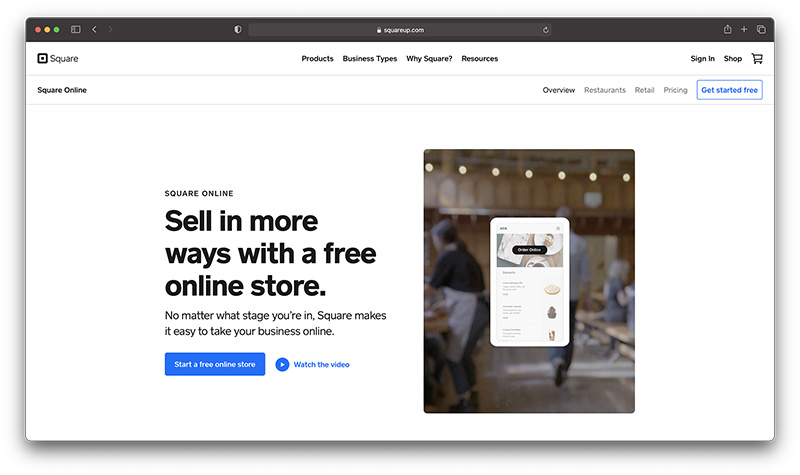

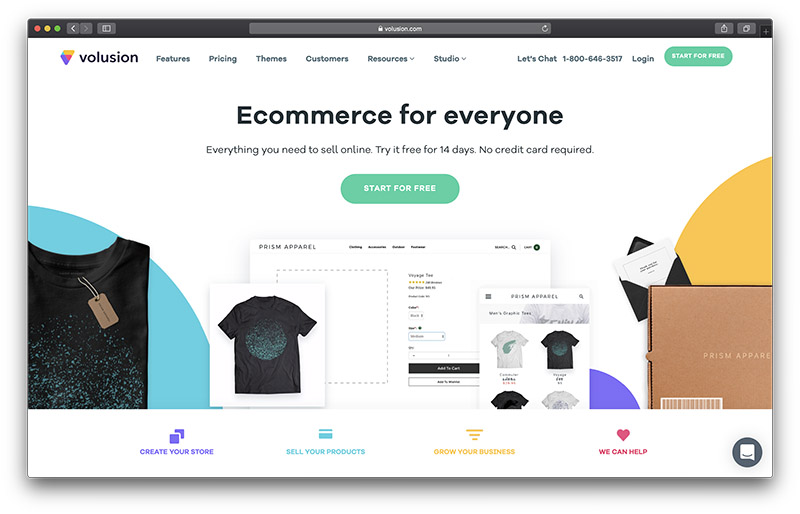



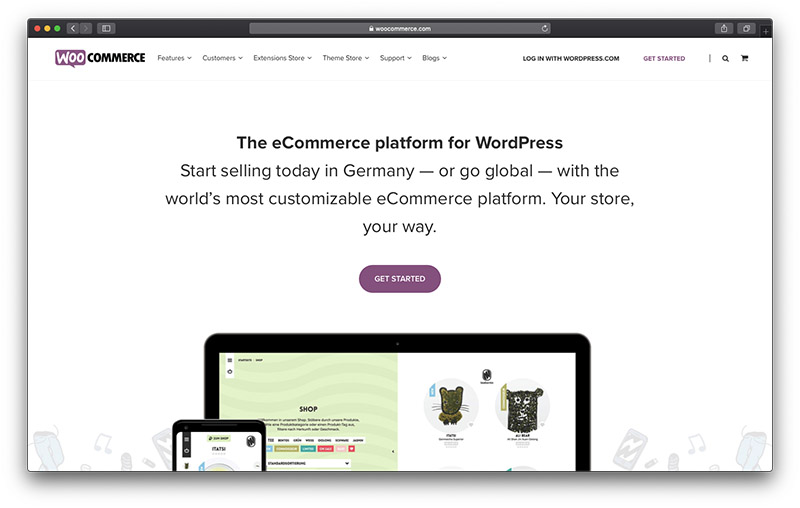


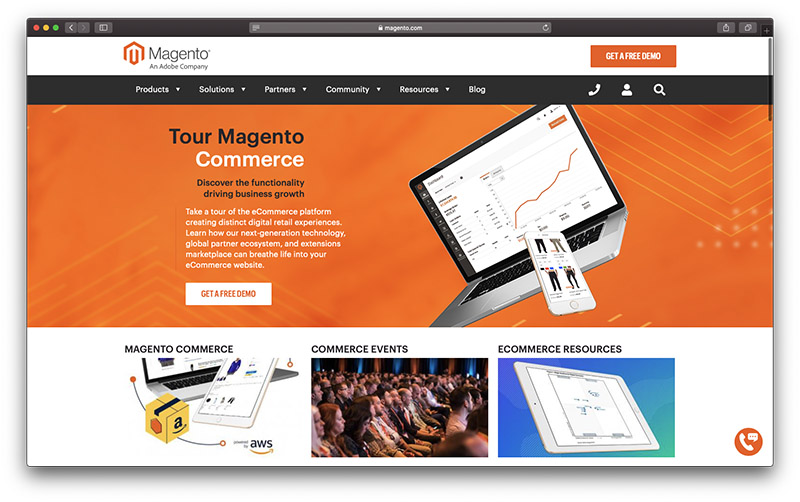
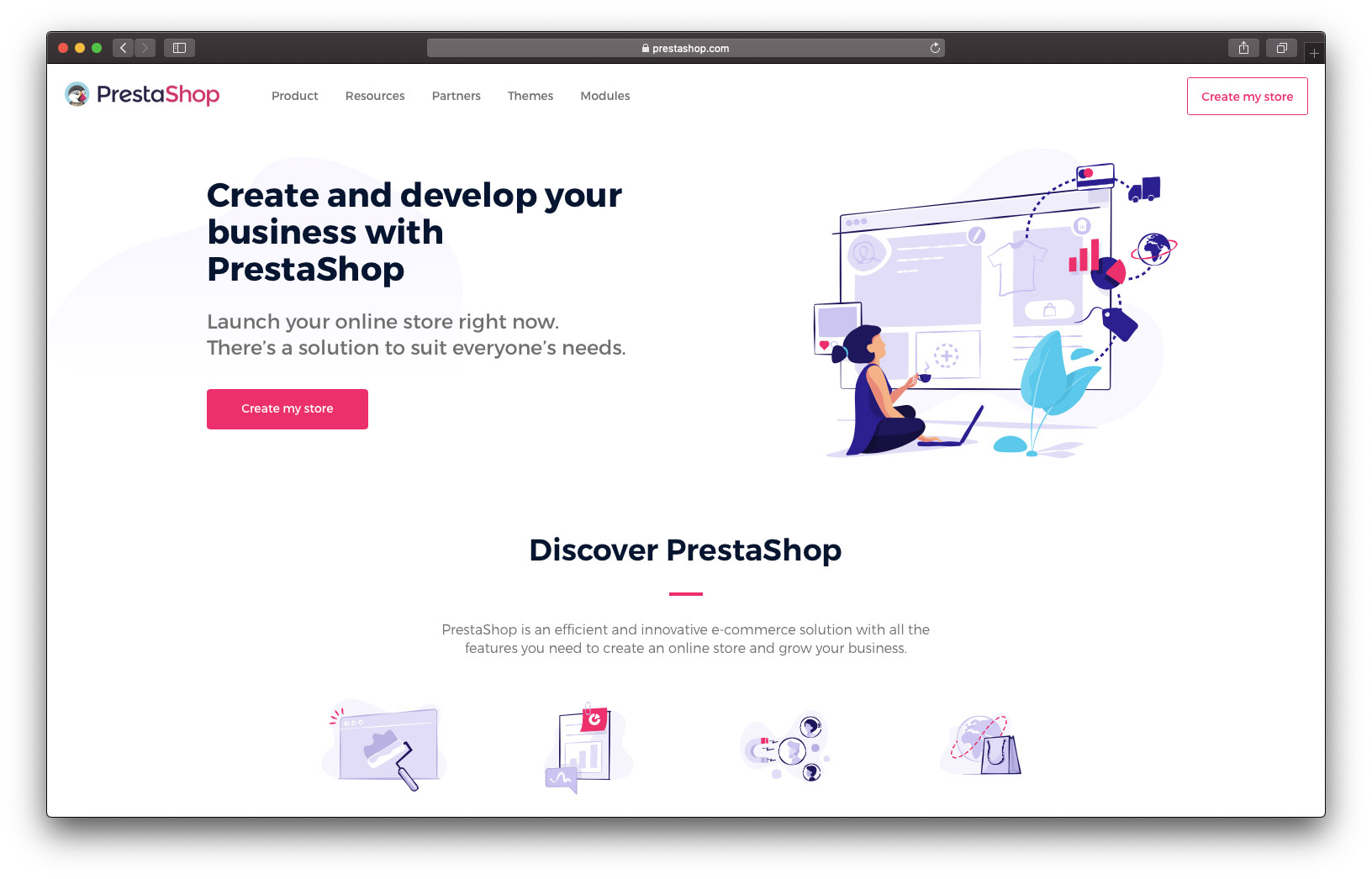



magento not magneto
Thanks for the heads up!